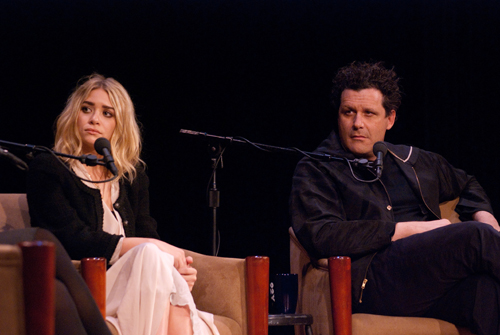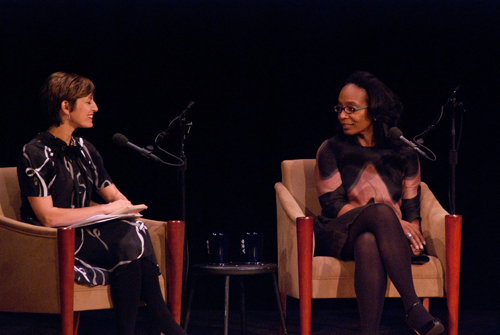Why do people love to hate fashion? There was a lot of finger pointing in an attempt to answer the age-old question at the 92nd Street Y on Wednesday night. At "The Future of Women's Fashion" discussion moderated by Glamour magazine Editor-in-chief Cindi Leive, Washington Post fashion editor Robin Givhan and designers Isaac Mizrahi and Ashley Olsen tossed around a couple of ideas, including one sports analogy.
"In the U.S. you don't think of fashion in the same category as other forms of visual arts...you don't put it in the same category as painting or sculpture," Givhan explained. "People condescend to fashion because it's a women's industry. No one would ever say that spending thousands of dollars for football season tickets is a waste of time and shallow and ridiculous, but a woman willing to spend $25,000 or $5,000 on a dress is somehow just being pretty."
Her comments were met with a round of applause worthy of a game-winning touchdown and elated gasps from Mizrahi. The assorted audience of high-heeled twentysomethings, aging New York ladies who've seen it all, and even a handful of curious men, were treated to the group's insights on an industry that is arguably out of -- or totally under -- control. The two designers naturally thought things were going sartorially swimmingly.
"I think it's never been a better time for people, for designers and for people buying clothes," Mizrahi said. "Perhaps it's not a good time for greedy people who want to make tons of money...and I think it's great because for years designers and merchants and customer were saying, 'What is this? It's getting out of hand.' And what we're going through now is a real necessity to get us to [an industry] that will actually function."

Joyce Culver for the 92nd Street Y
Olsen concurred, noting, "There's so much opportunity out there for people my age."
But Givhan, speaking from a shopper's perspective estimated that on a scale of one to ten, the current state of fashion is a three or a four.
"For a long time the fashion industry was kind of just coasting on trendy handbags and trendy shoes. I think this time is really forcing people to rework the whole structure of the fashion industry and a huge part of that is teaching customers what's really valuable," she said.
And who better to impart such style lessons than America's own First Lady Michelle Obama? Although Givhan argues against an overarching 'Michelle Obama Effect,' ("No one raced out and bought $2,000 Jason Wu dresses"), she thinks the FLOTUS has set a great example for women over the age of 30:
"She's shown you can incorporate fashion into your life in a way that really works and doesn't make you look silly and that doesn't necessarily negate your IQ." Givhan also mentioned Obama's hand in shifting the female professional uniform from boxy suits to tasteful dresses.
"She's an actual woman. She isn't a tiny size. She isn't a huge size. She's a real size," Mizrahi added.

Joyce Culver for the 92nd Street Y
However, in the wake of industry blows such as the Ralph Lauren model retouching controversy, is fashion truly ready to embrace a "real-sized" woman? And is that what customers expect to see?
"What has struck me is that for all of the complaining and the blogging about how thin models are no one is not buying clothes from designers who use thin models," Givhan said. "The only thing that has stopped them from buying is the economy, not because they were reacting to the images they were seeing."
Mizrahi agreed: "Fashion advertising is hateful, yet they wouldn't do it if it didn't work."
Givhan did extend a compliment to the fashion magazine business, which she views as trying to help customers find ways to indulge during the recession and celebrating style.
So then what, exactly, is the future of fashion?
"It's going to be more democratic," Givhan said.
"It's going to be less obvious and less visual. More about fetishes. More fetishistic!" Mizrahi exclaimed.
Olsen responded with perhaps the most promising words.
"It's going to be more exciting. And more fun."
Read more about the panel HERE.
Who Is The Ultimate Game Changer In Style? VOTE NOW!
And follow HuffPost Style on Twitter and become a fan of HuffPost Style on Facebookwhile you're at it.
Our 2024 Coverage Needs You
It's Another Trump-Biden Showdown — And We Need Your Help
The Future Of Democracy Is At Stake
Our 2024 Coverage Needs You
Your Loyalty Means The World To Us
As Americans head to the polls in 2024, the very future of our country is at stake. At HuffPost, we believe that a free press is critical to creating well-informed voters. That's why our journalism is free for everyone, even though other newsrooms retreat behind expensive paywalls.
Our journalists will continue to cover the twists and turns during this historic presidential election. With your help, we'll bring you hard-hitting investigations, well-researched analysis and timely takes you can't find elsewhere. Reporting in this current political climate is a responsibility we do not take lightly, and we thank you for your support.
Contribute as little as $2 to keep our news free for all.
Can't afford to donate? Support HuffPost by creating a free account and log in while you read.
The 2024 election is heating up, and women's rights, health care, voting rights, and the very future of democracy are all at stake. Donald Trump will face Joe Biden in the most consequential vote of our time. And HuffPost will be there, covering every twist and turn. America's future hangs in the balance. Would you consider contributing to support our journalism and keep it free for all during this critical season?
HuffPost believes news should be accessible to everyone, regardless of their ability to pay for it. We rely on readers like you to help fund our work. Any contribution you can make — even as little as $2 — goes directly toward supporting the impactful journalism that we will continue to produce this year. Thank you for being part of our story.
Can't afford to donate? Support HuffPost by creating a free account and log in while you read.
It's official: Donald Trump will face Joe Biden this fall in the presidential election. As we face the most consequential presidential election of our time, HuffPost is committed to bringing you up-to-date, accurate news about the 2024 race. While other outlets have retreated behind paywalls, you can trust our news will stay free.
But we can't do it without your help. Reader funding is one of the key ways we support our newsroom. Would you consider making a donation to help fund our news during this critical time? Your contributions are vital to supporting a free press.
Contribute as little as $2 to keep our journalism free and accessible to all.
Can't afford to donate? Support HuffPost by creating a free account and log in while you read.
As Americans head to the polls in 2024, the very future of our country is at stake. At HuffPost, we believe that a free press is critical to creating well-informed voters. That's why our journalism is free for everyone, even though other newsrooms retreat behind expensive paywalls.
Our journalists will continue to cover the twists and turns during this historic presidential election. With your help, we'll bring you hard-hitting investigations, well-researched analysis and timely takes you can't find elsewhere. Reporting in this current political climate is a responsibility we do not take lightly, and we thank you for your support.
Contribute as little as $2 to keep our news free for all.
Can't afford to donate? Support HuffPost by creating a free account and log in while you read.
Dear HuffPost Reader
Thank you for your past contribution to HuffPost. We are sincerely grateful for readers like you who help us ensure that we can keep our journalism free for everyone.
The stakes are high this year, and our 2024 coverage could use continued support. Would you consider becoming a regular HuffPost contributor?
Dear HuffPost Reader
Thank you for your past contribution to HuffPost. We are sincerely grateful for readers like you who help us ensure that we can keep our journalism free for everyone.
The stakes are high this year, and our 2024 coverage could use continued support. If circumstances have changed since you last contributed, we hope you'll consider contributing to HuffPost once more.
Already contributed? Log in to hide these messages.

